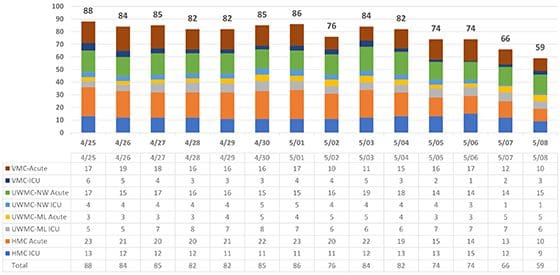As we look forward to a sunny weekend and celebrations of Mother’s Day, we are also seeing rays of hope from our hospitals and communities. The inpatient census is declining and, as of today, there are fewer than 60 patients with COVID-19 in the UW Medicine hospitals. This is the lowest number of inpatients since the last week of March.
This is also a good time to remind everyone that physical distancing is still critically important. With the good weather and all of the stress of staying home, I want to be outside, go to the parks, and be with my friends, but I know this is the time to stick with it. We can enjoy the outdoors while also staying safe and healthy. For example, here is guidance from Public Health – Seattle & King County on Fishing in the Time of COVID-19. We can use these same ideas for other outdoor activities: stay close to home, practice physical distancing, go out with your family or household, wash your hands frequently and wear a face mask or face cover.
With this encouraging news, our response to COVID-19 continues to evolve, and we want to share the following updates with you:
- Antibody Testing: Practical Guidance for Primary Care Providers
- Remdesivir Availability
- Clarifications on COVID-19 Daily Attestations
UW Medicine Hospitals COVID-19 Activity

Antibody Testing: Practical Guidance for Primary Care Providers from Dr. Vicky Fang (UWNC)
I’ve had several providers ask for clarification regarding COVID-19 antibody testing. We know that the community looks to UW as a leader in COVID-19 diagnostics and to us as a source of trusted information.
The availability of this testing has been advertised to our community and our patients. This communication to patients is very transparent in saying that we have much to learn about how to use this test and that the test result is currently unlikely to change medical management or what physical distancing precautions are recommended. Communications have also stated that, nevertheless, a patient may schedule an appointment with us to discuss the test.
The outcome of this is that we are entering into discussions with our patients where we are expected to use shared decision making about a new test for a new disease. Since we are all taught to avoid ordering tests that do not change clinical management and patients are very excited about this test, the discussion is challenging. That said, we can draw on our experiences from similar situations.
First: Be prepared. Review the UW Medicine FAQ. IgG antibody may be detectable as early as 3-6 days after symptom onset, but the median time to seroconversion is 10-12 days with essentially all patients seropositive by 3 weeks. Our UWNC procedure to wait for the patient to be at least 25 days after the initial onset of symptoms and 14 days asymptomatic was designed to optimize safety to our laboratory staff and be beyond the point when virtually all patients would have seroconverted. The duration of seropositivity is unknown, though we know that IgG for other coronaviruses tends to be detectable for up to several years.
Second: Emphasize to the patient that we cannot say that a positive serology indicates immunity, and we do not endorse any relaxation of social distancing recommendations based on serology results. There just has not been enough time and information to give any assurance. That said, you should know that there have not yet been any case reports of reinfection with COVID-19 in either humans or animals.
Third: Listen carefully to the patient. While we cannot guarantee immunity based on this test, and we have no therapy based on this test, the test result does speak to likelihood of prior infection and that information may be of value to our patients. They may have anxiety that would be quelled by the knowledge. They may be suffering post-viral fatigue that they wish to explain. They may be under the mistaken impression that an upper respiratory infection (URI) they had was COVID-19 and be more likely to keep to social distancing if they saw a negative serology result. They may wish to donate convalescent serum.
In shared decision making, the patient brings the questions and values, and we bring information and options.
Remdesivir Availability at UW Medicine
Remdesivir is a novel IV antiviral that appears to benefit patients with COVID-19. A recent clinical trial showed that hospitalized patients who received this therapy recovered a few days earlier. Remdesivir is not widely available yet. However, UW Medical Center – Montlake and UW Medical Center – Northwest currently have access to this medication through an expanded access program for a small subset of critically ill patients who meet certain clinical criteria.
We hope to have much broader access to this medication through the FDA Emergency Use Access in the near future and will keep you informed.
Clarifications on COVID-19 Daily Attestation
Earlier this week the University of Washington announced that all employees must complete a daily COVID-19 attestation in Workday when they work on-site. That policy specifically excludes UW Medicine employees, but some individuals who work in UW Medicine hospitals and clinics will have access to the Workday tool, including School of Medicine faculty and staff. We are providing answers to the most common questions to help with your daily attestation.
Do all UW Medicine staff and faculty need to perform an attestation at the beginning of their work shift?
Yes. All staff and faculty should continue to perform an attestation at the beginning of their work shift.
Where should I perform my attestation?
You should continue to follow the UW Medicine policy to perform your attestation by signing in on the first unit you work on during your shift. UW Medicine employees do not need to use Workday to do this. If you are not a medical center employee, you can use either the paper sign-in process or Workday. For example, UW School of Medicine faculty can use either attestation.
How can I check whether I am considered a medical center employee?
When you log in to Workday, look for your “organization” name in your profile. If you see “UW Med,” you are a medical center employee and excluded from attesting in Workday.
Do I need to attest in Workday if I am not a medical center employee?
If you work in a clinical area, you can use either Workday or the paper sign-in. If you do not work in a clinical area, you should use the Workday tool. If you do not meet the “UW Med” exclusion described above, you will see the “Working On-Site Attestation” icon when you log into Workday. Click on the icon to complete the attestation survey.
What is the reason for requiring a daily attestation?
The daily attestation requirement is an important step in ensuring the safety and health of our patients and co-workers as more employees work on-site and as we begin to gradually increase patient visits for surgeries and procedures as well as for ambulatory care.
What happens if I have symptoms of COVID-19?
If you are sick or have one or more of the symptoms listed on the attestation survey, you must stay home or leave your work site. You should also follow your department’s procedure for calling out sick or requesting to work from home.
Do I need to complete the attestation survey if I am teleworking?
No. You do not need to complete the attestation if you are teleworking. Attestation is only necessary when you work on-site at any UW Medicine clinical or non-clinical building or on the UW campus.
Where can I get more information?
If you have questions, please talk with your supervisor.
I hope you have nice family celebrations for Mother’s Day. Please maintain physical distancing when you go outside into the warm air and sunshine and be safe!
Sincerely,
John Lynch, MD, MPH
Medical Director, Infection Prevention & Control
Associate Medical Director, Harborview Medical Center
Division of Allergy & Infectious Diseases, UW School of Medicine

